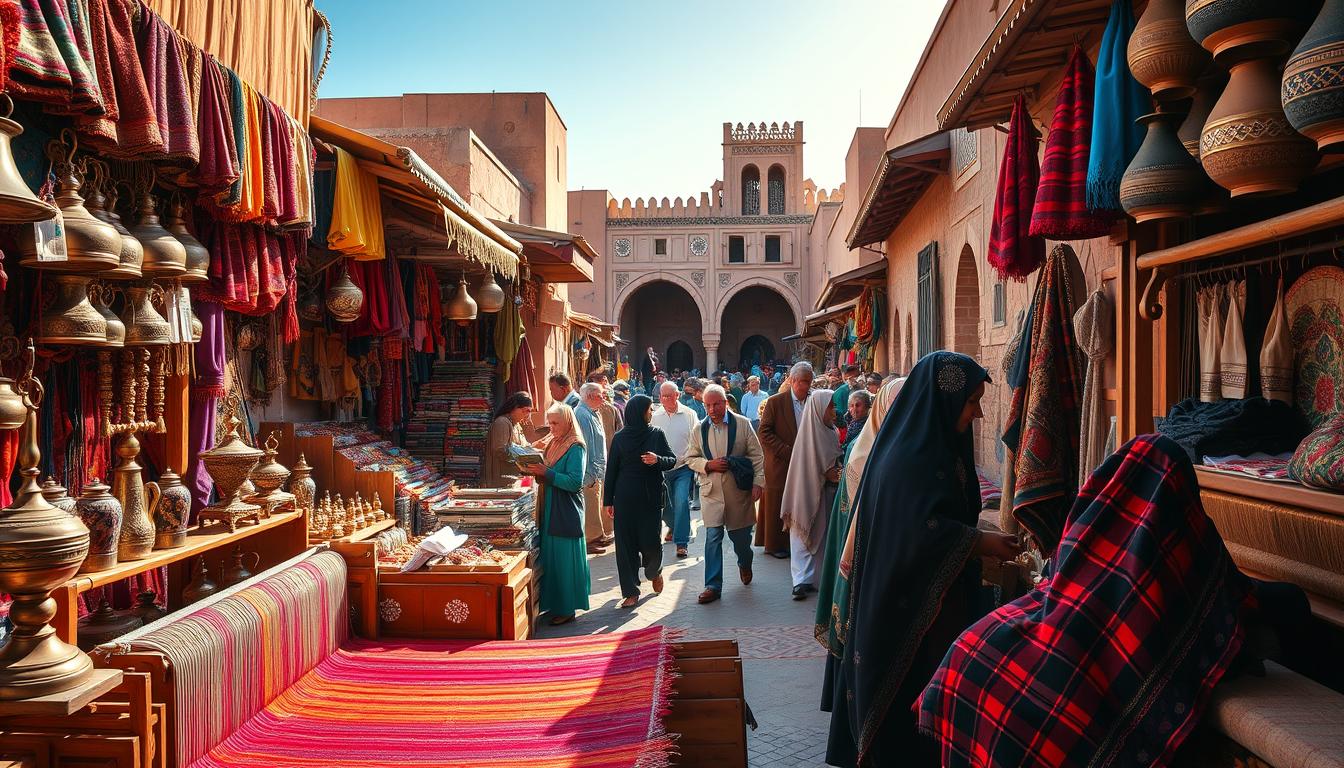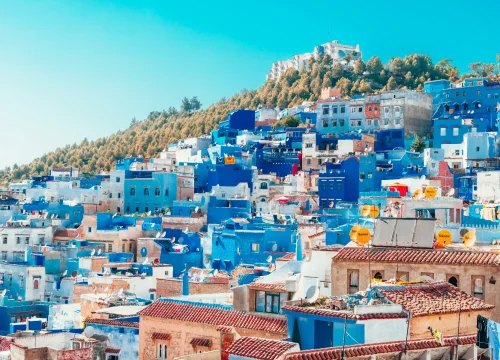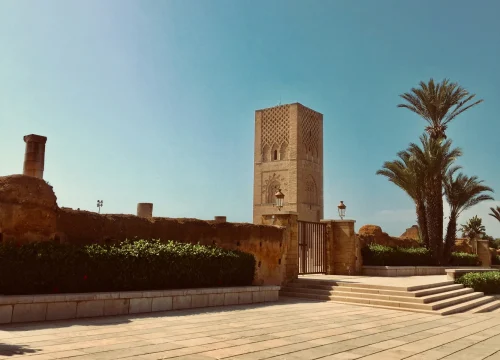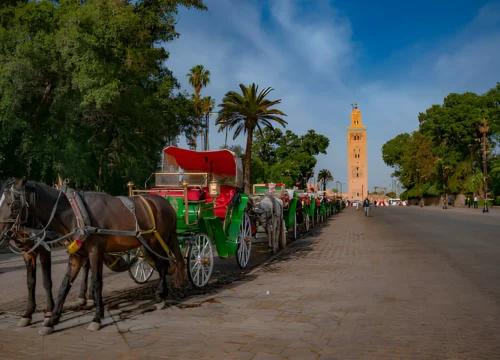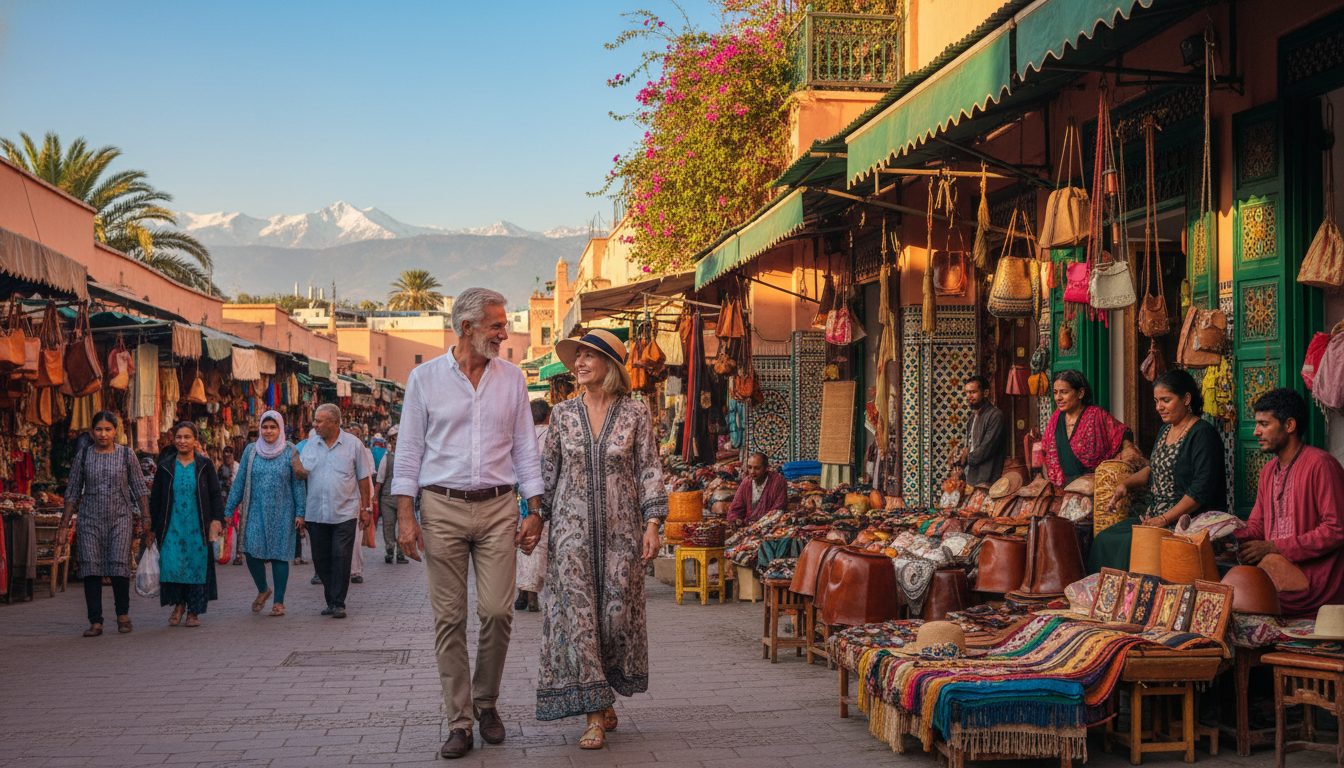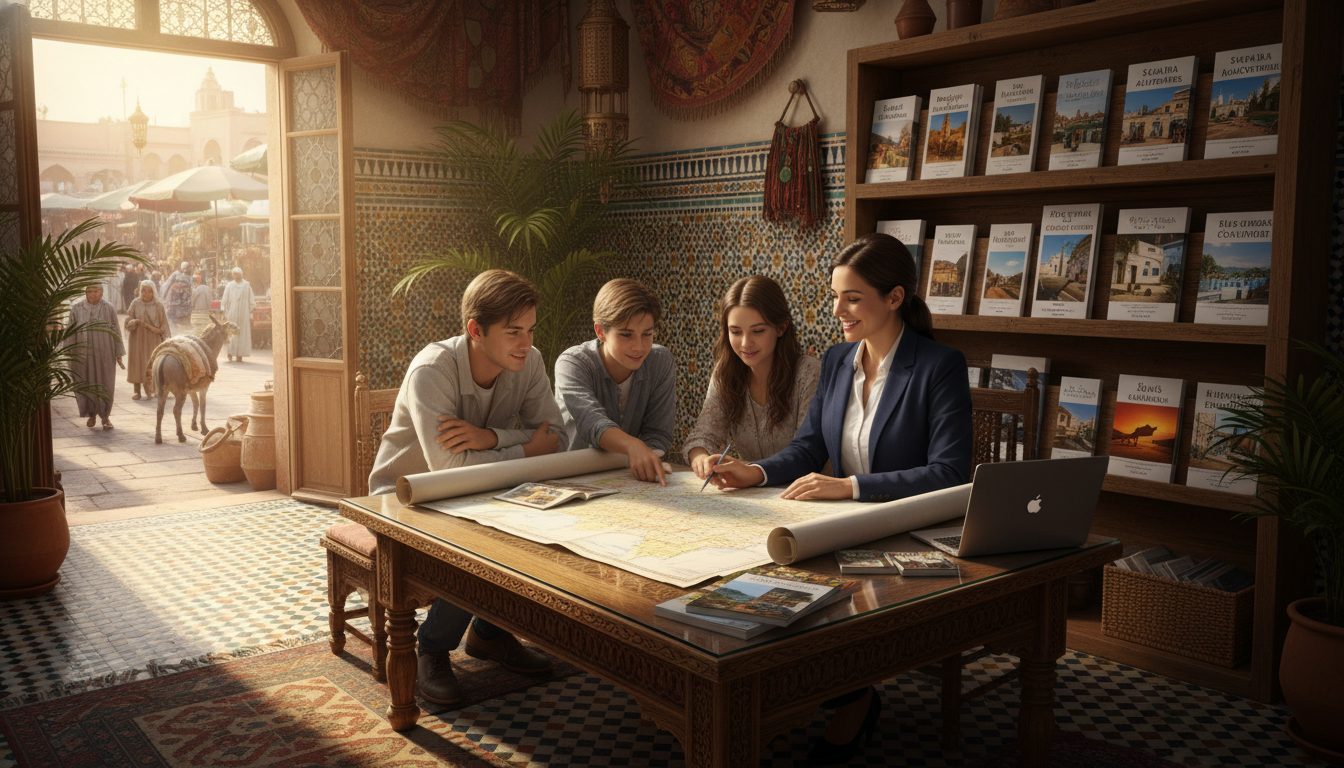When you enter the world of Moroccan culture, you’re surrounded by vibrant traditions and warm people. Morocco is a mix of cultures, including Arabic, Berber, French, and Spanish.
This mix is seen in its buildings, food, music, and everyday life. Morocco stands out as a special place. The people’s kindness is as amazing as the lively markets and beautiful views.
Key Takeaways
- Moroccan culture is a blend of Arabic, Berber, French, and Spanish influences.
- The country’s architecture, cuisine, and music reflect its diverse heritage.
- Warm hospitality is a hallmark of Moroccan culture.
- Visitors can experience vibrant markets and stunning landscapes.
- The blend of traditions creates a unique cultural identity.
Experience the Vibrancy of Moroccan Markets
Walking through Marrakech’s souks, you’re hit with a burst of colors and smells. It’s like stepping into a world full of sights and smells. You’ll find everything from beautiful carpets to stunning jewelry.
The Colors and Scents of Souks
The souks in Marrakech are a treat for your senses. The bright colors and enticing smells of spices and food mix with the sounds of chatter and music. You’ll see all sorts of things, like:
- Handmade textiles and clothing
- Intricately designed jewelry
- Local spices and traditional Moroccan delicacies
- Handcrafted home decor items
Craftsmanship and Artisanship
Moroccan craftsmanship is top-notch. Artisans in Marrakech are proud of their work. They create stunning pieces that show off Morocco’s rich culture. You can find:
- Zellij tile work: Beautiful tiles that decorate buildings and homes
- Woodwork: Gorgeous wooden items, from furniture to decorative boxes
- Textiles: Bright fabrics, detailed carpets, and embroidered clothes
Bargaining Tips for Shopping
Bargaining is key in Moroccan souks. Here’s how to shop smart:
- Know the market price of what you want
- Be ready to negotiate; it’s expected
- Start with a lower offer than you’re willing to pay
- Be friendly and respectful; a good attitude helps
When you travel to Morocco, don’t miss the markets. Marrakech’s souks are a mix of culture, skill, and fun. They’ll give you memories you’ll always treasure.
Dive into Moroccan Cuisine
Exploring Moroccan cuisine opens a world of scents, tender meats, and sweet pastries. It shows the country’s rich cultural mix, blending Arabic, Mediterranean, and African flavors.
Traditional Dishes You Must Try
Moroccan food is famous for its rich flavors. You must try tagines, slow-cooked stews, and couscous, a staple made from semolina flour. Don’t miss pastilla, a pie filled with meat and spices, and harira, a soup with tomatoes, lentils, and chickpeas.
The Art of Moroccan Spices
Spices are key in Moroccan cooking, adding depth to dishes. Common spices include cumin, coriander, cinnamon, ginger, and turmeric. Each family has its own secret spice blend.
Ras el hanout, meaning “head of the shop,” is a mix of over 30 spices. It’s a must-have in many Moroccan kitchens.
Dining Etiquette
Dining in Morocco is a cultural experience. Meals are eaten with the right hand, not the left. When dining at a Moroccan home, wait for the host to start eating.
It’s polite to try a bit of everything. This shows you appreciate the food and the host’s kindness.
Discover the Rich History of Morocco
The history of Morocco is a captivating journey through time. It’s filled with the influence of ancient civilizations. As you explore this country, you’ll discover layers of history that have shaped its culture, architecture, and identity.
Ancient Civilizations and Their Influence
Morocco’s location made it a key spot for ancient civilizations. The Berbers, Phoenicians, Romans, and Arabs all left their mark. The Berbers, for example, were the first people here. Their legacy is seen in the language, customs, and art of Morocco.
The Roman influence is clear in Volubilis, a UNESCO site near Meknes. This ancient city shows the Romans’ engineering and cultural achievements in Morocco.
Major Historical Sites to Visit
When you visit Morocco, don’t miss these historical sites. In Rabat, the capital, see the Kasbah of the Udayas. This 17th-century fortress has amazing views of the Atlantic Ocean. Also, visit the Mawlay Hassan Tower in Rabat. It’s a key landmark that shows the city’s rich history.
| Historical Site | Location | Significance |
|---|---|---|
| Volubilis | Near Meknes | Ancient Roman city, UNESCO World Heritage site |
| Kasbah of the Udayas | Rabat | 17th-century fortress with stunning ocean views |
| Mawlay Hassan Tower | Rabat | Historic tower symbolizing Rabat’s rich history |
These sites offer a peek into Morocco’s past. They show the country’s cultural diversity and architectural heritage. Exploring these places will deepen your understanding of Morocco’s complex history and its vibrant culture today.
Understand Moroccan Hospitality
As you dive into Moroccan culture, you’ll see how important hospitality is. Moroccans welcome guests with open arms, showing their rich heritage and values.
Moroccan hospitality is all about warmth, generosity, and respect for guests. It’s a big part of their society. You’ll feel it when you meet the locals.
The Tradition of Tea Ceremonies
The traditional tea ceremony is a big part of Moroccan hospitality. You’ll enjoy sweet mint tea, a sign of friendship and respect. The ceremony is a special way of preparing and serving tea, showing welcome and hospitality.
Tea ceremonies are a big deal in Moroccan culture. They’re filled with history and meaning. By joining a tea ceremony, you’ll learn a lot about Moroccan values and traditions.
Welcoming Guests: A Cultural Norm
In Morocco, welcoming guests is a big part of their culture. Locals love to share their culture, traditions, and way of life with visitors. You’ll feel right at home because of the warmth and generosity of the Moroccan people.
Experiencing Moroccan hospitality will teach you about respect, generosity, and kindness. You’ll be treated with dignity and respect. It’s a chance to really connect with the locals.
Explore Morocco’s Diverse Landscapes
As you travel through Morocco, you’ll see amazing landscapes. You’ll find the Sahara Desert’s sand dunes and the Atlas Mountains’ peaks. Each place has its own natural beauty and adventures.
From the Sahara to the Atlas Mountains
The Sahara Desert is a must-see in Morocco. You can ride camels, watch sunsets, or sleep in a Berber camp. It’s more than a landscape; it’s a way to connect with nature and Berber culture.
The Atlas Mountains are cooler and stunning. You can hike, visit villages, and see local plants and animals. The mountains have valleys and peaks, perfect for nature and adventure fans.
Coastal Beauty of Agadir and Essaouira
Morocco’s coast has lovely towns for beach lovers. Agadir has wide beaches and modern comforts. You can try water sports, go on a boat trip, or just relax.
Essaouira is known for its calm vibe and art scene. It’s great for windsurfing and kitesurfing. The old medina is full of narrow streets and markets, showing the town’s history and culture.
Exploring Morocco’s landscapes is an adventure you won’t forget. From the Sahara’s dunes to the Atlas Mountains and the coast, each place offers something special. They mix natural beauty with rich culture.
Experience Moroccan Festivals and Celebrations
Immerse yourself in Moroccan culture and discover its most captivating festivals and celebrations. These events showcase Morocco’s rich heritage through tradition, music, and community spirit.
Morocco’s festivals reflect its diverse cultural landscape. From the joyous Eid al-Fitr to the enchanting Fes Festival of World Sacred Music, each event offers a unique glimpse into Morocco’s soul.
Celebrating Eid al-Fitr
Eid al-Fitr, marking the end of Ramadan, is a significant celebration in Morocco. The country comes alive with feasts, decorations, and communal prayers. Visitors can experience the warmth of Moroccan hospitality during this time, as locals welcome guests to join in their festivities.
In cities like Marrakech, the atmosphere during Eid al-Fitr is electric. Streets are adorned with colorful decorations, and the scent of traditional sweets fills the air. It’s a time when the community comes together, strengthening bonds and celebrating the spirit of togetherness.
The Magic of the Fes Festival of World Sacred Music
The Fes Festival of World Sacred Music is a highlight of Morocco’s cultural calendar. This festival brings together musicians from around the globe, celebrating the universal language of music. Held in the historic city of Fes, the event features performances against a backdrop of ancient architecture.
The festival is more than just music; it’s a journey through the spiritual and cultural heritage of different civilizations. By attending, you’ll gain a deeper understanding of how sacred music bridges cultural divides and fosters global harmony.
Moroccan festivals like these offer a glimpse into the country’s rich cultural tapestry. Whether you’re in Marrakech or Fes, participating in or observing these celebrations will enrich your understanding of Moroccan culture and leave you with unforgettable memories.
Uncover Moroccan Music and Dance
Exploring Moroccan culture, you’ll find its music and dance truly captivating. These aren’t just for fun; they express feelings, share stories, and celebrate life’s big moments.
The Fusion of Traditional and Modern Sounds
Moroccan music is a mix of Berber, Arabic, and African beats. This mix creates a sound that’s both old and new. You might dance to Gnawa’s rhythms or move to modern Moroccan pop.
The evolution of Moroccan music is a tale of cultural exchange and creativity. From folk songs in the Atlas Mountains to Marrakech’s fusion bands, there’s a wide range of music to discover.
Popular Instruments and Their Significance
Moroccan music uses many traditional instruments, each with its own story. The oud, a stringed instrument, is key in Arabic music. The qraqeb, metal castanets, add rhythm to Gnawa music.
| Instrument | Description | Significance |
|---|---|---|
| Oud | A stringed instrument similar to the lute | Central to Arabic music, used in classical and folk music |
| Qraqeb | Metal castanets | Used in Gnawa music for percussive rhythms |
| Gembri | A three-stringed bass instrument | Used in Gnawa music to provide deep, resonant tones |
The significance of these instruments goes beyond their sound. They connect modern Moroccan music to its rich heritage.
Appreciate Moroccan Architecture
As you explore Marrakech, Morocco, you’ll see the beauty of Moroccan architecture. It’s a mix of old traditions and new influences. This creates a unique look that is truly Moroccan.
The Beauty of Riads
Riads are a key part of Moroccan architecture. They have peaceful gardens and detailed decor. These homes, now guesthouses or hotels, show off the country’s architectural past.
The intricate zellij tile work and carved wooden ceilings are just a few examples of the skill in these places.
When you visit a riad, you see the mix of privacy and welcome. This shows the values of Moroccan culture. These homes are peaceful spots in busy cities.
Must-See Mosques and Palaces
Morocco has some of the most beautiful mosques and palaces. The Koutoubia Mosque in Marrakech is a famous landmark. It’s a great example of Almohad architecture.
The Bahia Palace in Marrakech also shows off Moroccan craftsmanship. It has detailed stone carvings and beautiful tiles.
Seeing these places, you’ll understand more about Moroccan history and culture. Mosques and palaces show the country’s rich heritage.
Connect with Local Communities
Traveling to Morocco lets you dive deep into its culture. You’ll see that the culture is all about the people and their everyday lives.
Joining in community activities or just hanging out with locals can teach you a lot about Moroccan culture. You’ll have chances for real connections and unforgettable moments.
Volunteering Opportunities in Morocco
Volunteering is a great way to meet locals. Morocco has many groups that need help with projects like teaching, saving the environment, and health care. Volunteering lets you help others and learn about their lives.
Engaging with Local Culture
Getting to know local culture is easy. Just have dinner with a family or join in on traditional events. These moments help you see the beauty of Moroccan culture and its values.
When you connect with locals, you’ll feel Morocco’s famous warmth. This experience will make your trip special and give you stories to share forever.
Learn Basic Moroccan Arabic Phrases
Starting your Moroccan adventure? Learning basic Arabic phrases can make it better. Morocco, with its rich culture, welcomes those who care about its language and traditions.
Essential Phrases for Travelers
Knowing key Arabic phrases will help you get around Morocco. It also makes the locals like you more. Here are some phrases you should know:
- Hello: Marhaba
- Thank you: Shukraan
- How are you?: Kayfa halak?
- I’m lost: Ana dayyee’
| Phrase | Translation | Usage |
|---|---|---|
| Marhaba | Hello | Greeting someone |
| Shukraan | Thank you | Expressing gratitude |
| Kayfa halak? | How are you? | Asking about someone’s well-being |
Cultural Context of the Language
It’s important to know the cultural side of Moroccan Arabic. It’s not just about the words. It’s about the respect and intent behind them.
Moroccans value when visitors try to speak their language. It shows respect for their culture.
Using the right form of language matters. Formal language is polite when speaking to elders or in formal places.
By learning these phrases and their cultural meaning, you’ll connect with Moroccans better. This will make your trip more enjoyable.
Plan Your Perfect Moroccan Getaway
Getting ready for your trip to Morocco? Think about visiting cities like Casablanca. It’s a mix of modern and traditional. Your trip will be filled with cultural spots, historical sites, and natural wonders.
Cities to Explore
Casablanca’s busy streets are a sight to see. Then there’s Fez and Marrakech, with their ancient medinas. Each city offers something special. Fez has ancient buildings, and Marrakech is all about lively souks.
Responsible Travel Tips
Traveling responsibly is key. Respect local customs and the environment. This way, you’ll enjoy your trip more and help the places you visit.

